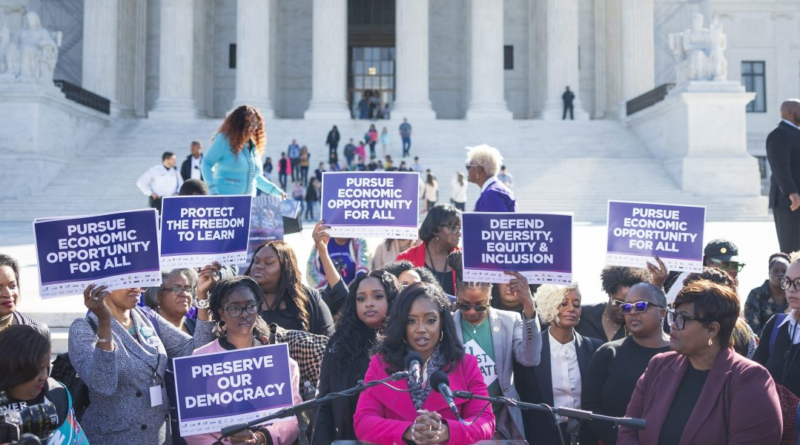Florida appeals court rules that grant program for Black women entrepreneurs violates the Civil Rights Act
A U.S. federal court of appeals panel suspended a venture capital firm’s grant program for Black women business owners, ruling that a conservative group is likely to prevail in its lawsuit claiming that the program is the discriminatory.
The ruling against the Atlanta-based Fearless Fund is another victory for conservative groups waging a sprawling legal battle against corporate diversity programs that have targeted dozens of companies and government institutions. The case against the Fearless Fund by was brought last year by the American American Alliance for Equal Rights, a group led by Edward Blum, the conservative activist behind the Supreme Court case that ended affirmative action in college admissions.
In a 2-1 ruling, the panel of the U.S. Court of Appeals for the 11th Circuit in Miami found that Blum was likely to prevail in his lawsuit claiming the grant program violates section 1981 of the 1866 Civil Rights Act, which prohibits discrimination on the basis of race when enforcing contracts. The Reconstruction-era law was originally intended to protect formally enslaved people from economic exclusion, but anti-affirmative action activists have been leveraging it to challenge programs intended to benefit minority-owned businesses.
The court ordered the Fearless Fund to suspend its Strivers Grant Contest, which provides $20,000 to businesses that are majority owned by Black women, for the remainder the lawsuit. The ruling reversed a federal judge’s ruling last year that the contest should be allowed to continue because Blum’s lawsuit was likely to fail. However, the grant contest has been suspended since October after a separate panel of the federal appeals court swiftly granted Blum’s request for an emergency injunction while he challenged the federal judge’s original order.
The appeals court panel, consisting of two judges appointed by former President Donald Trump and one appointed by President Barack Obama, rejected the Fearless Fund’s arguments that the grants are not contracts but charitable donations protected the First Amendment right to free speech.
“The fact remains, though, that Fearless simply —and flatly — refuses to entertain applications from business owners who aren’t ‘black females,’” the court’s majority opinion said, adding “every act of race discrimination” would be deemed expressive speech under the Fearless Fund’s argument.
In statement, Blum said the “American Alliance for Equal Rights is grateful that the court has ruled that the Fearless Fund’s racially exclusive grant competition is illegal.”
“Our nation’s civil rights laws do not permit racial distinctions because some groups are overrepresented in various endeavors, while others are under-represented,” he added.
But Alphonso David, Fearless Fund’s legal counsel who serves as president & CEO of The Global Black Economic Forum, called the ruling “the first court decision in the 150+ year history of the post-Civil War civil rights law that has halted private charitable support for any racial or ethnic group.”
He said the Fearless Fund would continue fighting the lawsuit.
“This is not the final outcome in this case; it is a preliminary ruling without a full factual record. We are evaluating all of our options,” he said in a statement.
The appeals panel also rejected the Fearless Fund’s contention that Blum had no standing because the lawsuit was filed on behalf of three anonymous women who failed to demonstrate that they were “ready and able” to apply for the grant or that they had been injured by not being to do so.
Judge Robin Rosenbaum, an Obama appointee, disagreed in a blistering dissent, likening the plaintiffs’ claims of harm to soccer players trying to win by “flopping on the field, faking an injury.” Rosenbaum said none of the plaintiffs demonstrated that they had any real intention to apply for the grants in what she called “cookie-cutter declarations” that were ”threadbare and devoid of substance.”
The Strivers Grant Fund is one of several programs run by the foundation arm of the Fearless Fund, a small firm founded to address the wide racial disparity in funding for businesses owned by women of color. Less than 1% of venture capital funding, for example, goes to businesses owned by Black and Hispanic women, according to the nonprofit advocacy group digitalundivided.



